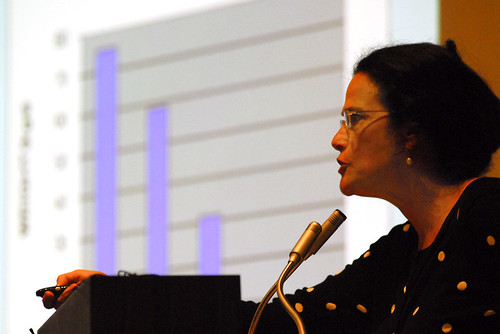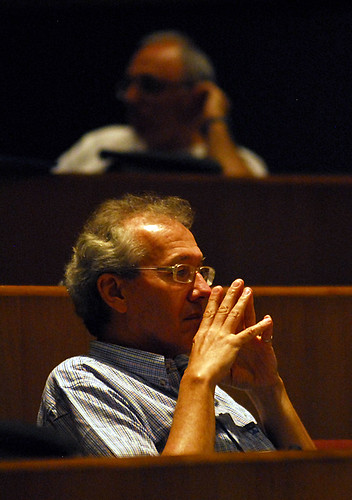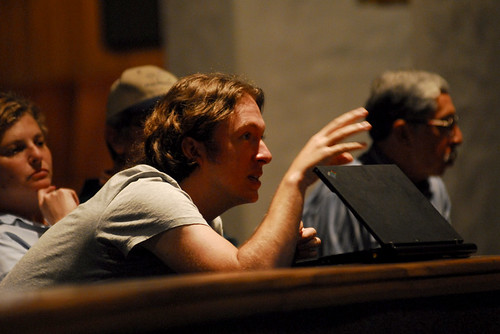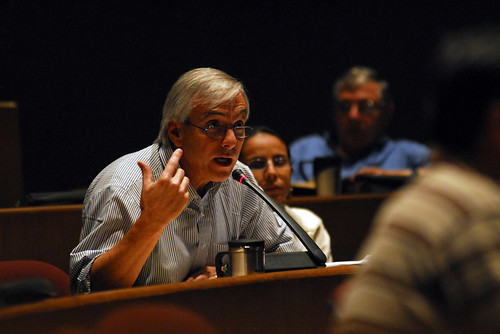 Louise Sperling kicked off Day 3 of CIAT’s KS week by stimulating our thinking around the issue of 'Reaching End Users' (REU).
Louise Sperling kicked off Day 3 of CIAT’s KS week by stimulating our thinking around the issue of 'Reaching End Users' (REU).“While REU was rejected as a deliberate thrust in CIAT’s strategy, and is not visible in the MTPs, the ideas around REU are very high on the agenda of the new CGIAR where planned funding mechanisms and concepts should change dramatically to become far more interactive”, she said.
Louise gave two examples that highlight the benefits of a REU approach for CIAT’s research:
 Beans: The work and research on seed systems was very impact orientated, involving more and different kinds of partners, with a focus on setting up new platforms and non-linear models. The quick decentralization and outreach channels helped this work benefit some 8 million people in just 4 years.
Beans: The work and research on seed systems was very impact orientated, involving more and different kinds of partners, with a focus on setting up new platforms and non-linear models. The quick decentralization and outreach channels helped this work benefit some 8 million people in just 4 years.Agroenterprises: Mark Lundy’s work has shown that markets are needed to make our research useful and “get our methods out”. His work focused on scaling up partners in Central America so that they can link farmers to markets. This successful partnership work is based on the following organizing principles:
- Clear shared objectives
- Shared responsibilities, costs and benefits
- Outputs as inputs for innovation
- Learning cycle: empirical evidence for theory dev
- Policy implications
- Improved practices
 The 4-year program involved 25 organizations and 36,000 farm families. It increased income related to natural resource and had concrete gender equity impacts. The processes proved to lead to sustainability as partners are able to continue on their own after the end of the project.
The 4-year program involved 25 organizations and 36,000 farm families. It increased income related to natural resource and had concrete gender equity impacts. The processes proved to lead to sustainability as partners are able to continue on their own after the end of the project.Both examples showcase how much REU includes efforts to adopt practices based on research outputs, for organizational changes, and for better collaboration with partners.
“This approach could be used by our crops, and the soils programs”, suggests Louise. She also wonders if issues like benefits for poor women, policy changes and new organizational models are really only related to delivery. REU is more than that: It is an invitation to rethink the kinds of impact that CIAT wants to report.
 “Let’s rethink who is the pea who is the elephant. I would say that CIAT is the pea and wonder how can we leverage the huge potential for the elephant.” This metaphor reminds us that very big and influential potential partners are out there and that we have to get them on board if we want to promote our research and its uptake.
“Let’s rethink who is the pea who is the elephant. I would say that CIAT is the pea and wonder how can we leverage the huge potential for the elephant.” This metaphor reminds us that very big and influential potential partners are out there and that we have to get them on board if we want to promote our research and its uptake.How to implement REU? Louise suggests to:
- Define our mandate
- Synthesis high profile lessons
- Build a strategy
- Map intra center opportunities for impact on the ground
- Raise funds strategically across programs for REU
The discussion focused mainly on partnerships. Here are some reactions:
- We have to go to certain key partners with global outreach, invite them to join from the beginning. A strategic approach would be much more effective.

- We need to have multiple and mixed partners with high and lower levels of engagement. We focus on INGOs but there are farmer associations and private companies who can help in leveraging. We need to begin to build more diversity and resilience within the system. Focusing only on one partner (for budget reasons) is risky and often doesn’t work.

- Sometimes you don’t choose your partners and you have to deal with difficult partners.
- We have too small budgets for dissemination and cultivating partnerships: The problem with partners is not money, the NGO partners having way more money. The problem is that we don’t have what they want. We need active participants in a co-learning process instead of passive delivery. We should support others to reach end users instead of trying to reach them ourselves.

- The CGIAR is really moving to science for impact. It is a fantastic opportunity for CIAT.
- REU is a cross-cutting core value. It has to be integrated into our MTP, and projects, but not necessarily as a program. More strategy around REU would be useful to institutionalize REU.

- End users or users: we are not talking about poor farmers only. We need to better characterize who our users are.
Stay tuned...
By Simone Staiger

No comments:
Post a Comment